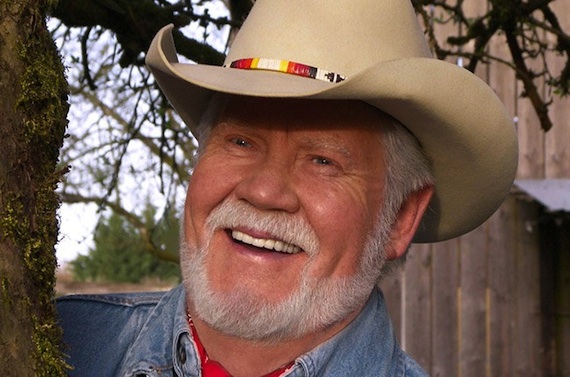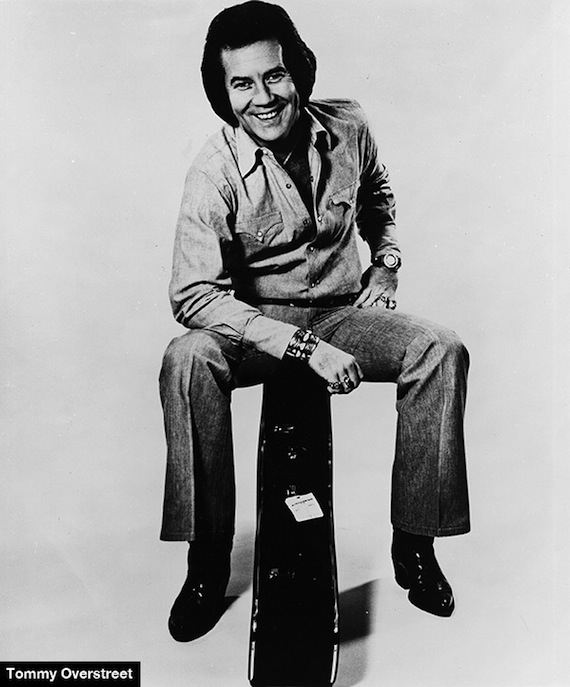

Tommy Overstreet
Singer, songwriter and former Music Row executive Tommy Overstreet passed away on Nov. 2 at his home in Hillsboro, Oregon.
He performed his final show two years ago, and his health deteriorated thereafter. He began home hospice care about a month ago and died from complications relating to emphysema at age 78.
Overstreet enjoyed a run of success on the Billboard country charts during the 1970s. His Top 10 hits included “Gwen (Congratulations)” (1971), “I Don’t Know You (Anymore)” (1971), “Ann (Don’t Go Runnin’)” (1972), “Heaven Is My Woman’s Love” (1972), “Send Me No Roses” (1973), “I’ll Never Break These Chains” (1973), “(Jeannie Marie) You Were a Lady” (1974), “If I Miss You Again Tonight” (1974), “I’m a Believer” (1975), “That’s When My Woman Begins” (1975) and “Don’t Go City Girl On Me” (1977). He was a frequent guest on the national TV show Hee Haw.
Born in Oklahoma City in 1937, Tommy Overstreet was the cousin of 1920s pop superstar Gene Austin, whose million-sellers included “My Blue Heaven,” “Five Foot Two, Eyes of Blue,” “Ramona” “Bye, Bye Blackbird” and “Tonight You Belong to Me.” Overstreet always cited Austin as a major influence.
He rose to singing prominence as a teenager in Texas. Overstreet appeared regularly on Houston television in the early 1960s on a show called Kitchen Canteen. He also appeared in a Houston musical titled Hit the Road.
Overstreet attended the University of Texas in Abilene, studying radio and TV production. He appeared on local radio and television stations there as “Tommy Dean From Abilene.” During summer months, he toured with cousin Gene Austin, learning to be a show-business professional.
After serving in the U.S. Army, Overstreet moved to Los Angeles to write songs and record pop music. Returning to Texas, he worked with Slim Willet, of “Don’t Let the Stars Get In Your Eyes” fame, then formed his own band in the mid 1960s.
Overstreet came to Nashville in 1967. He became the manager of the Dot Records office that year. His hits for the label led to popularity overseas, as well as in the U.S. During his hit-making days, he did more than 30 international tours. The International Rodeo Association named him its Entertainer of the Year in 1979, 1980 and 1982.
When Dot merged with ABC in 1974, Overstreet left as an executive but remained as an artist for the company. He moved to Elektra Records in 1979. He subsequently recorded for the AMI, Gervasi, Silver Dollar and Madacy labels.
With his band The Nashville Express, the star logged more than a million miles on his tour bus, driving it himself during his early years. Overstreet moved to Branson, Missouri in 1985. He opened a restaurant and became a headliner in the tourism mecca.
Between 1969 and 1986, Overstreet placed 34 singles on the Billboard charts. In addition to the hits listed above, notable recorded performances included “If Love Was a Bottle of Wine” (1977), “Yes Ma’am” (1978), “Fadin’ In, Fadin’ Out” (1978), “This Time I’m In It For the Love” (1977), “What More Could a Man Need” (1979) and a cover of the Gary Puckett pop hit “Young Girl” (1976).
Overstreet was noted for his mellow baritone, good looks, distinctive white hair, snappy attire and optimistic personality. He recorded more than 25 albums, authored a memoir and co-wrote a children’s book. His songs were recorded by Tony Booth, Pat Boone, Tequila Sunrise and Tommy Cash, among others.
Tommy Overstreet moved to Hillsboro, Oregon in 2001 to be near his wife’s parents.
He is survived by wife Diane and daughters Ariel, Amber and Lisa. His son and road manager, Thomas, died in an accident in 1986.
A memorial service will take place on Sun., Nov. 22, at 3 p.m. at Evergreen Christian Center in Hillsboro, Oregon.


About the Author
Robert K. Oermann is a longtime contributor to MusicRow. He is a respected music critic, author and historian.View Author Profile


